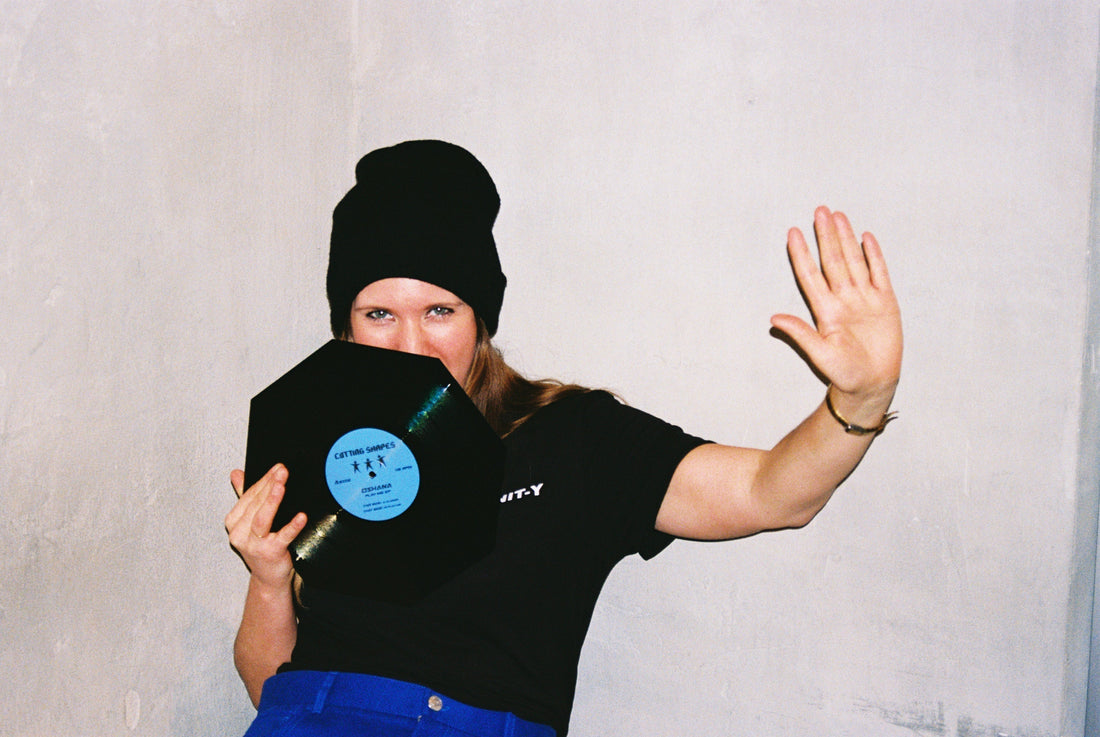
Tanz Talks 001 // Oshana
The Tanz Talks series is born. With this sequence of features we would like to highlight people who bring others together on the dance floor. This can be DJs/Bouncers/Promoters, anyone who is helping people Tanzform, and in general striving to make the scene a better place. We kick off the series with someone who inspires us, the first live act we will host at a Tanzform event, and the queen of the octagon for Cutting Shapes 002: Oshana.

Tanzform: Thanks for being part of the Cutting Shapes series. Was there any reason why you chose the octagon shape?
Oshana: Thanks for having me! I always thought a record shaped like a stop sign would be cool. Fun fact: the octagon symbolizes protection and positivity from all sides, representing the transition from the earthly plane to the celestial one. I googled that.
Check out Cutting Shapes 002...
Tanzform: We know a lot of DJs/producers start in the dance floor. What were the early days on the dance floor looking like for you? Any rave memories that particularly stand out for you?
Oshana: The dance floors I grew up on were nothing like the ones I experience in Berlin. Since I started so young, most of my early rave education came from reading magazines like DJ Times and Mixmag, as well as watching TV programs like The Electric Circus. I didn’t actually start clubbing until I turned 18, when I began touring my local club circuit as a resident DJ and promoter.
Fortunately, growing up in the Midwest meant I was surrounded by an incredible lineup of homegrown talent from Detroit and Chicago. DJs like DJ Dan, Mark Farina, DJ Sneak, and Ryan Elliott regularly passed through my city, shaping my musical influences. Back then, clubs closed at 2 a.m. and catered more to bottle service than dancing, which meant the real energy was found at the afterparties.
Some of my best memories come from festivals like WMC in Miami. One night, in particular, stands out—the night I saw Richie Hawtin perform at Pawn Shop. That set was unforgettable. He brought his drum machines and delivered a mind-blowing hybrid performance. That moment changed everything for me, opening my eyes to the limitless possibilities of live performances.
Tanzform: You are often DJing, but can also be found performing live. Do you find the connection with the dance floor can be different when playing live as opposed to playing records?
Oshana: Absolutely. DJing and performing live are two completely different experiences. When I DJ, it feels like I’m playing with the crowd—feeding off their energy, the records almost play themselves. Once that connection is established, the music flows effortlessly. Without it, DJing can feel like work.
Performing live, on the other hand, is a more solitary act. Instead of drawing from the crowd’s energy, I have to generate my own to ignite them. The freedom of expression that comes with playing live brings a unique sense of confidence and openness, allowing for a deeper, more personal connection. It’s raw and direct.
Tanzform: What is your ideal dancefloor environment?
Oshana: My ideal dancefloor is a perfect balance of atmosphere and functionality. It’s aesthetically pleasing, serves great cocktails, and has an incredible sound system—powerful yet refined, so you don’t have to shout to be heard or feel the booth shake like an earthquake. There’s plenty of space to dance, chill-out areas to take a break, and, most importantly, it doesn’t leave you smelling like an ashtray. Most of all, it’s intimate enough to create a collective vibe with like-minded people around you.

Tanzform: Many aspiring to work in the music industry may think it is perfect. As we know, it is not always as simple as that. How do you keep the balance as a touring artist?
Oshana: I maintain balance by building routines, reinforcing good habits, and staying focused. For me, that means being mindful of my diet, practicing meditation, and staying active through regular sports. I also make a point to limit time on social media, catch up on sleep during off periods, and keep a single-minded approach to the industry around me. Taking care of my mental health is a top priority.
Tanzform: In modern times some would say originality is becoming more scarce. Would you agree with this statement? In your opinion, how important is it as an artist to maintain originality?
Oshana: I couldn’t agree more. I know firsthand how hard it is to find your voice in an industry that’s constantly shifting—especially while trying to stay relevant. Still, that doesn’t make the search any less important. Without my own sound, I’m just part of the noise.
The importance of originality really depends on what drives you as an artist. For me, being an artist isn’t just what I do—it’s who I am. It gives me a sense of purpose and a deeper connection to the world around me. But that connection is only possible when I’m completely vulnerable and unapologetically authentic.
Tanzform: Collaboration and supporting each other within our scene is a key component for us. Who would you like to give a special mention to in terms of artists and DJs to keep an eye on?
Oshana: I completely agree. I’m lucky to be at a stage in my career where many of my friends and inspirations are thriving. But I’m sure I could find plenty of truly praiseworthy artists on the Tanzform site. Beyond that crew, there are some exciting up-and-comers on Psionic that I’m keeping an eye on—Session 4000, Juanma Alegre, Marcos Coya, and Yu, to name a few.
Tanzform: Last of all, favourite piece on the Tanzform website? Besides your EP of course! Haha.
Oshana: Ooh, that’s a tough one! I’m torn between the Tanzform Crop Top and the Miami Beat$ T-Shirt—but I can never resist a good crop top. So, crop top it is!
